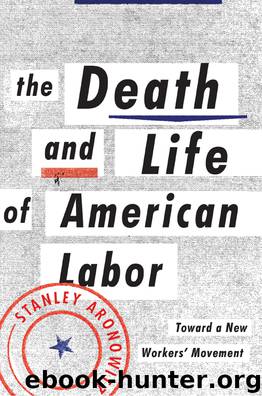The Death and Life of American Labor by Stanley Aronowitz

Author:Stanley Aronowitz
Language: eng
Format: epub
Publisher: Verso Books
Published: 2014-10-07T04:00:00+00:00
In 1974, Al Shanker, president of the large New York local, was elected president of the AFT, defeating his mentor David Selden, who had held the position since 1968. One of Shanker’s major actions as local president had been to call teachers out on strike in 1968 to oppose three community-controlled school boards, in Harlem, Bedford Stuyvesant, and the Lower East Side, that had attempted to exercise jurisdiction over the assignment of teachers. Shanker and his colleagues preferred to deal with the central Board of Education rather than with the black and Latino leaders of these newly created local boards. The union succeeded in crippling community control over education for the next forty-five years.
Shanker died in office in 1997, after twenty-three years as AFT president. During his long tenure, the union had grown to almost a million members, but its chief competitor, the independent National Education Association (NEA) had more than twice as many. Still, AFT had won bargaining rights for teachers in America’s largest cities—New York, Los Angeles, and Chicago—and prevailed in many medium-sized cities as well, including Newark, New Jersey, and Washington, D.C. Shanker’s leadership was highly centralized, a style that rankled members of the largest locals—they called it Shankerism—but was nevertheless followed by his successors, Sandra Feldman and Randi Weingarten.
Beginning as a reputed militant, Shanker developed into a labor “statesman” who softened his approach to confrontation with school authorities, tightly aligned the AFT with the Democratic Party at the national and local levels, and counseled greater union “responsibility” toward school systems. The early Shanker had been inspired, following Selden, by the militant history of the Auto Workers and insisted that teachers should put aside their professional pretenses and act more like industrial workers. He later turned toward professionalism because he came to believe that teachers were unfairly treated by school authorities and the public and would no longer gain from militant action. He then urged the union to adopt a professional ideology as the best guarantee of job security. This standpoint entailed union sponsorship of more teacher credentials, professional development programs in the schools, and the introduction of pay rewards for teachers holding advanced degrees. Pubic relations gradually replaced the strike weapon and shop-floor militancy.
Download
This site does not store any files on its server. We only index and link to content provided by other sites. Please contact the content providers to delete copyright contents if any and email us, we'll remove relevant links or contents immediately.
| Anthropology | Archaeology |
| Philosophy | Politics & Government |
| Social Sciences | Sociology |
| Women's Studies |
The Secret History by Donna Tartt(19052)
The Social Justice Warrior Handbook by Lisa De Pasquale(12187)
Thirteen Reasons Why by Jay Asher(8893)
This Is How You Lose Her by Junot Diaz(6877)
Weapons of Math Destruction by Cathy O'Neil(6265)
Zero to One by Peter Thiel(5786)
Beartown by Fredrik Backman(5737)
The Myth of the Strong Leader by Archie Brown(5499)
The Fire Next Time by James Baldwin(5431)
How Democracies Die by Steven Levitsky & Daniel Ziblatt(5215)
Promise Me, Dad by Joe Biden(5141)
Stone's Rules by Roger Stone(5081)
A Higher Loyalty: Truth, Lies, and Leadership by James Comey(4954)
100 Deadly Skills by Clint Emerson(4921)
Rise and Kill First by Ronen Bergman(4779)
Secrecy World by Jake Bernstein(4741)
The David Icke Guide to the Global Conspiracy (and how to end it) by David Icke(4707)
The Farm by Tom Rob Smith(4502)
The Doomsday Machine by Daniel Ellsberg(4484)
